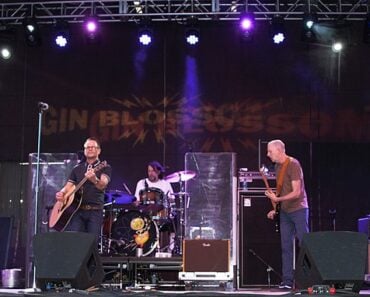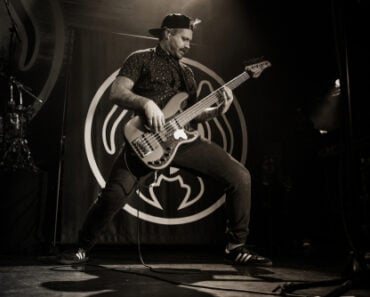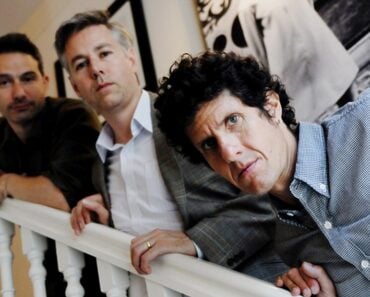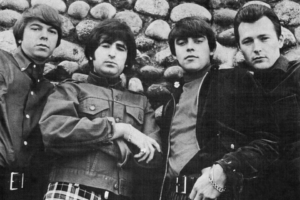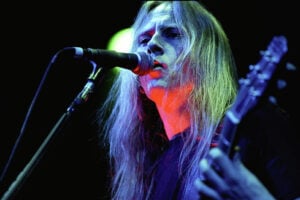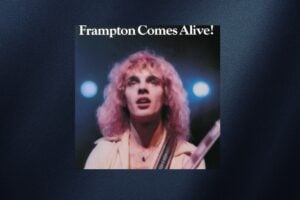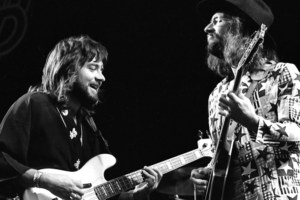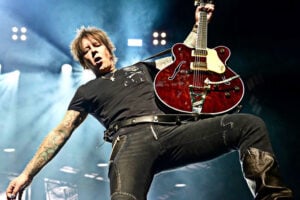
Feature Photo: ChrisJamesRyanPhotography / Shutterstock.com
Emerging from the London music scene of the late 1960s, the band that would become known as UFO embarked on a tumultuous, five-decade journey that saw them become a crucial, if often underappreciated, pillar of hard rock. Formed in 1968, the group initially began under names like Hocus Pocus, crafting a sound rooted in blues and the burgeoning “space rock” movement. This early style, characterized by extended instrumental passages, earned them initial success in Germany and Japan but failed to make a significant impact in their native UK or the United States. It was only with a pivotal lineup change in 1973 that the band shed its psychedelic skin and adopted the harder-edged, melodic rock sound that would define their legacy.
Over a career that spanned from 1968 to 2024, UFO released 23 studio albums, 14 live albums, and 16 compilations, selling over 20 million records worldwide. The band’s history is marked by a revolving door of personnel, with over 40 musicians passing through its ranks and three separate disbandments. Despite this instability, they achieved moderate chart success, particularly in the late 1970s and early 1980s. Their iconic 1979 live album, Strangers in the Night, is frequently cited as one of the greatest live recordings in rock history and reached the Top 10 in the UK. This period of success, however, was often curtailed by internal conflicts that prevented them from reaching the stratospheric heights of some of their contemporaries.
While UFO may not have achieved the household-name status of bands like Led Zeppelin or Black Sabbath, their influence is immeasurable. They served as a critical transitional group, bridging the gap between early hard rock and the New Wave of British Heavy Metal that would dominate the 1980s. Major artists including Steve Harris of Iron Maiden, Kirk Hammett of Metallica, Dave Mustaine of Megadeth, and the members of Def Leppard have all cited UFO as a primary influence. Anchored by the unwavering presence of vocalist Phil Mogg, the band’s sole constant member, UFO’s story is one of artistic resilience, groundbreaking musicianship, and a persistent, fighting spirit that produced a catalog of songs that continues to inspire generations of rock musicians.
Phil Mogg
As the co-founder, lead vocalist, and only constant member of UFO from its inception in 1968 until its final dissolution in 2024, Phil Mogg was the band’s unshakeable anchor. His distinctive, soulful voice and street-smart lyrical observations defined the band’s character through every one of its numerous lineup changes and stylistic shifts. Mogg appeared on all 23 of UFO’s studio albums, from the early space rock of UFO 1 (1970) to the final covers album, The Salentino Cuts (2017). He was the primary lyricist, crafting narratives for classic tracks like “Doctor Doctor,” “Lights Out,” and “Love to Love,” which were brought to life by the music of his various collaborators, most notably Michael Schenker and Pete Way.
Throughout the band’s turbulent history, marked by breakups and reunions, Mogg was the driving force who repeatedly reassembled the group. When UFO first disbanded in 1983, it was Mogg who reformed it a year later. After a second breakup in 1989, he and Pete Way relaunched the band in 1991. His leadership was not without its own conflicts; his famously contentious relationship with guitarist Michael Schenker was a recurring source of drama that often coincided with the band’s most creative periods and its most abrupt collapses. During UFO’s hiatuses, Mogg remained musically active, forming the project Mogg/Way with bassist Pete Way, which released two albums, Edge of the World (1997) and Chocolate Box (1999).
He also fronted the side project $ign of 4, releasing an album in 2002. In 2018, Mogg announced his intention to retire from UFO following a 50th-anniversary tour, a decision that ultimately set the stage for the band’s conclusion. After suffering a heart attack in August 2022, the final tour dates were canceled, and in April 2024, Mogg confirmed that UFO was officially finished. His final project, Moggs Motel, released its debut album in 2024, closing a remarkable chapter in rock history.
Pete Way
Pete Way was the co-founding bassist of UFO and a principal songwriter whose melodic bass lines and manic stage presence were central to the band’s identity for decades. He was with the band for three distinct tenures: from its formation in 1968 until 1982, a brief return from 1988 to 1989, and a final, lengthy stint from 1991 to 2008. Way’s songwriting credits include such enduring classics as “Too Hot to Handle” and “Shoot Shoot,” and his energetic, high-octane performances, often in his trademark striped trousers, heavily influenced a generation of bassists, including Iron Maiden’s Steve Harris. He performed on a total of 16 UFO studio albums, from UFO 1 (1970) through The Monkey Puzzle (2006).
In 1982, following the release of the album Mechanix, Way departed UFO, expressing dissatisfaction with the band’s increasingly commercial and keyboard-heavy direction. He immediately sought new projects, first co-founding Fastway with former Motörhead guitarist “Fast” Eddie Clarke. However, a contract dispute with Chrysalis Records prevented him from recording with them, leading him to a brief but notable gig playing bass for Ozzy Osbourne during the Diary of a Madman tour. He then formed his own band, Waysted, which released several albums, including the successful Save Your Prayers in 1986. After rejoining UFO in 1991, he remained a fixture until 2008, when health issues and difficulties obtaining a U.S. work visa forced him to step away permanently. Way passed away in August 2020 at the age of 69, just weeks after his former UFO bandmate Paul Chapman.
Andy Parker
Andy Parker was the original and definitive drummer for UFO, joining in August 1969 when he was just 17 years old. His powerful, driving style provided the backbone for the band’s sound across its most iconic eras. As a founding member alongside Phil Mogg and Pete Way, Parker was instrumental in shaping UFO’s transition from their early space rock sound to the hard-hitting force they became. He played on all of the band’s classic 1970s albums, including Phenomenon (1974), Lights Out (1977), and the seminal live album Strangers in the Night (1979). His first tenure with the band lasted until their 1983 breakup.
Following UFO’s dissolution, Parker briefly joined Pete Way’s band Waysted in 1984, appearing on their self-titled EP. He did not participate in the mid-80s reformation of UFO but returned for the classic lineup reunion in 1993, playing on the album Walk on Water (1995) before departing again that same year. He made his final return to the band in 2005, replacing Jason Bonham. During this last and longest tenure, he recorded four studio albums: The Monkey Puzzle (2006), The Visitor (2009), Seven Deadly (2012), and A Conspiracy of Stars (2015). A brief period of medical problems between 2005 and 2007 saw Jason Bonham temporarily fill his spot, but Parker soon recovered and remained UFO’s drummer until the band’s final show and subsequent dissolution in 2024.
Mick Bolton
Mick Bolton was the original guitarist and a co-founder of UFO, playing a crucial role in the band’s formation in 1968. His guitar work defined the band’s initial sound, which was a blend of hard rock, blues, and psychedelic-tinged space rock. Bolton performed on UFO’s first two studio albums, UFO 1 (1970) and UFO 2: Flying (1971), as well as their first live album, Live, which was recorded in Japan in 1971 and released shortly thereafter.
These early records, featuring extended tracks like the 26-minute “Flying” and the 19-minute “Star Storm,” found modest success in Germany and Japan, establishing the band’s first international following. However, Bolton’s musical style ultimately clashed with the direction vocalista Phil Mogg and drummer Andy Parker envisioned for the band. After growing tensions, Bolton left UFO in January 1972, marking the end of the band’s formative era and setting the stage for a search for a new guitarist who could propel them toward a harder, more direct sound.
Larry Wallis
Larry Wallis had a very brief and transient tenure with UFO, joining as the band’s guitarist in February 1972 to replace the recently departed Mick Bolton. His time with the group lasted only until October of that same year. During this period, Wallis toured with UFO across Europe but did not contribute to any official studio recordings. His playing with the band is preserved only on bootleg live recordings and a televised performance on the French show Rock En Stock, where the band played a cover of Eddie Cochran’s “C’mon Everybody.”
Despite his short stay, Wallis’s career outside of UFO was extensive and significant. Shortly after leaving UFO, he joined the psychedelic rock band The Pink Fairies. Most notably, in 1975, he became the original guitarist for Motörhead, playing on their first album, On Parole, which was recorded in 1975 but not released until 1979. His work as a producer for Stiff Records further cemented his legacy in the British punk and new wave scenes.
Bernie Marsden
Bernie Marsden’s time in UFO was a short but important transitional phase for the band. He joined in November 1972, following the departure of Larry Wallis, and remained with the group until he was replaced by Michael Schenker in mid-1973. While Marsden toured with UFO in Europe, he did not appear on any of their official studio albums. His only recorded contributions were a pair of demos for the songs “Oh My” and “Sixteen,” which later appeared as bonus tracks on a reissue of the Phenomenon album.
Though his stint with UFO was fleeting, Marsden went on to achieve immense fame and success as a founding member of Whitesnake. Alongside David Coverdale, he co-wrote many of the band’s biggest early hits, including the iconic anthem “Here I Go Again,” “Fool for Your Loving,” and “Walking in the Shadow of the Blues.” His subsequent career firmly established him as one of the great guitarists and songwriters of the British hard rock scene.
Michael Schenker
Michael Schenker’s arrival in UFO in 1973 was the single most transformative event in the band’s history. Recruited from the Scorpions at the age of just 18, the German guitar prodigy immediately redefined UFO’s sound, steering them away from their space rock origins and toward a powerful, melodic, and technically brilliant style of hard rock. His impact was immediate, beginning with the 1974 album Phenomenon, which featured the future classics “Doctor Doctor” and “Rock Bottom.”
Over the next five years, Schenker was the primary musical architect of what is widely considered UFO’s classic era, contributing his virtuosic guitar work and songwriting to a string of seminal albums: Force It (1975), No Heavy Petting (1976), Lights Out (1977), and Obsession (1978). This period culminated in the legendary 1979 live album Strangers in the Night, which captured the band at the absolute peak of their powers.
Schenker’s relationship with the band, particularly with vocalist Phil Mogg, was famously volatile. His struggles with alcohol abuse and stage fright led to erratic behavior, and he abruptly quit the band in 1978 during the mixing of Strangers in the Night. He went on to form the highly successful Michael Schenker Group (MSG), but he would return to the UFO fold on two more occasions. He rejoined for the classic lineup reunion in 1993, which produced the album Walk on Water (1995), and again from 2000 to 2002 for the albums Covenant (2000) and Sharks (2002). Each of his tenures was marked by both creative brilliance and eventual acrimony, cementing his legacy as UFO’s most influential, yet most mercurial, member.
Danny Peyronel
Danny Peyronel joined UFO in August 1975, becoming the band’s first-ever full-time keyboardist. His arrival marked a significant evolution in the band’s sound, adding a new layer of melodic texture that would become a key component of their music moving forward. Peyronel performed on the 1976 album No Heavy Petting, where he not only played keyboards and sang harmony vocals but also made substantial songwriting contributions. He is credited as a writer on three of the album’s tracks, including “Can You Roll Her” and “Martian Landscape,” and he solely penned the song “Highway Lady.” His influence helped steer the band toward the more sophisticated, song-oriented approach that would fully blossom on their subsequent albums. Peyronel’s time with UFO was short-lived, as he departed in July 1976 and was replaced by Paul Raymond. After leaving, he formed his own band, The Blue Max, and later had a successful career with the band Tarzen and as a songwriter for artists like Meat Loaf and Sade. He would also reunite with other former UFO members in the band X-UFO.
Paul Raymond
Paul Raymond was one of UFO’s most crucial and long-serving members, contributing his multi-instrumental talents on keyboards and rhythm guitar across four separate tenures that spanned more than three decades. He first joined in 1976, replacing Danny Peyronel, and his arrival coincided with the band’s ascent to international stardom. His sophisticated keyboard textures and solid rhythm guitar work were integral to the sound of the classic albums Lights Out (1977) and Obsession (1978), as well as the live masterpiece Strangers in the Night (1979). He also played on No Place to Run (1980) before departing to join Michael Schenker’s new band, MSG.
Raymond’s deep connection to the band’s core members saw him return to the fold repeatedly. He rejoined for the Misdemeanor album and tour from 1984 to 1986, came back for the classic lineup reunion from 1993 to 1998, and finally returned for his longest continuous stint from 2003 until his death. During this final period, he recorded five more studio albums with the band, from You Are Here (2004) to The Salentino Cuts (2017). Outside of UFO, he was also a key member of Pete Way’s band, Waysted. In a tragic turn of events, Paul Raymond passed away from a heart attack in April 2019, just after completing the first leg of UFO’s 50th-anniversary farewell tour, “Last Orders.”
Paul Chapman
Known affectionately as “Tonka” for his resilient and powerful guitar playing, Paul Chapman had two distinct and important stints with UFO. He first joined in 1974 as a second guitarist to augment the band’s live sound during the tour for the Phenomenon album. This initial tenure was brief, and he did not record a studio album with them at the time, though his playing from this period can be heard on some BBC live session recordings. He left in early 1975 but was destined to return under much more significant circumstances.
Chapman’s most vital contribution to UFO came when he was rehired in late 1978 to fill the formidable shoes of Michael Schenker. He stabilized the band at a critical juncture, providing the guitar firepower for four studio albums: No Place to Run (1980), The Wild, the Willing and the Innocent (1981), Mechanix (1982), and Making Contact (1983). While this era did not reach the same commercial heights as the Schenker years, Chapman’s robust, blues-based style and songwriting contributions helped forge a new identity for the band, earning these albums a respected place in their catalog. After UFO disbanded in 1983, Chapman went on to play with his former UFO bandmate Pete Way in the band Waysted. Paul Chapman passed away in June 2020.
Neil Carter
Neil Carter joined UFO in 1980 as a guitarist and keyboardist, replacing the recently departed Paul Raymond. He was a vital creative force during a challenging transitional period for the band, contributing significantly to songwriting and performing on three studio albums: The Wild, the Willing and the Innocent (1981), Mechanix (1982), and Making Contact (1983). His multi-instrumental abilities, including saxophone, helped fill the void left by Schenker’s departure and pushed the band’s sound in a more contemporary, melodic rock direction. He remained with UFO until they disbanded in 1983.
Following his first stint with UFO, Carter embarked on a highly successful career as a key member of Gary Moore’s band throughout the 1980s, co-writing several songs, including the worldwide hit “Empty Rooms.” In a poignant and fitting turn, Carter returned to UFO in 2019 to take over keyboard and guitar duties for the band’s final “Last Orders” tour, following the sudden death of Paul Raymond—the very musician he had replaced nearly four decades earlier. He remained with the band until their final shows, bringing his journey with UFO full circle.
John Sloman
John Sloman’s involvement with UFO was very brief and largely behind the scenes. He was brought in as a session keyboardist during the recording of the 1981 album The Wild, the Willing and the Innocent, following the departure of Paul Raymond. However, his contributions went uncredited on the final album release. His time with the band was limited to these sessions in 1980, and he was not a touring member. Sloman is much better known for his more prominent roles as a vocalist. Prior to his work with UFO, he was the lead singer for the Welsh rock band Lone Star, where he sang on their 1977 album Firing on All Six alongside future UFO guitarist Paul Chapman. Immediately after his session work with UFO, he became the lead vocalist for Uriah Heep, recording the album Conquest with them in 1980.
Billy Sheehan
Billy Sheehan, the world-renowned and highly influential bassist, had a very short tenure with UFO as a touring member in early 1983. He was brought in to handle bass duties for a European tour supporting the Making Contact album after founding bassist Pete Way had departed the band. Sheehan did not record any studio material with UFO, and his time with the group was limited to this single tour before Paul Gray took over for the final leg of what became the band’s farewell tour. Sheehan’s association with UFO came about after his band, Talas, opened for them in Buffalo. His brief stint with UFO is a minor footnote in a legendary career that has seen him achieve global fame with his bands Talas, the David Lee Roth band, and the supergroup Mr. Big, where his revolutionary “lead bass” style has inspired countless musicians.
Paul Gray
Paul Gray, best known as the bassist for the punk and gothic rock band The Damned, had two separate stints with UFO during the 1980s. He first joined in late February 1983, taking over from touring bassist Billy Sheehan to complete the final dates of UFO’s farewell tour. After the band reformed in late 1984, Gray was a key member of the new lineup alongside Phil Mogg, guitarist Tommy McClendon, and returning keyboardist Paul Raymond. He played on the 1985 album Misdemeanor, contributing his solid bass work and co-writing several tracks, including “This Time” and “Blue.” He also appeared on the 1988 EP Ain’t Misbehavin’. Gray left the band in 1987, but his time with UFO represents an important chapter in the band’s mid-80s incarnation, bridging the gap between their classic era and their later reformations.
Tommy McClendon
Known by the stage name “Atomik Tommy M,” Tommy McClendon was the lead guitarist for UFO during their mid-1980s reformation. He joined the band in 1984 after Phil Mogg recruited him in Los Angeles, and his flashy, technical guitar style was a defining feature of this era’s more commercial, AOR-inflected sound. McClendon performed on two UFO releases: the 1985 studio album Misdemeanor and the 1988 EP Ain’t Misbehavin’. On Misdemeanor, he was a key songwriter alongside Phil Mogg, co-penning tracks like “Meanstreets,” “Heavens Gate,” and “Night Run.” His tenure lasted until 1988, after which he was replaced by a succession of short-term guitarists. After leaving UFO, McClendon went on to play with Soulmotor, the band formed by ex-Tesla bassist Brian Wheat.
Robbie France
Robbie France’s time with UFO was very brief, serving as the drummer for the initial reformation of the band in 1984. He toured with the group but departed in early 1985 before the recording sessions for the Misdemeanor album began. He was subsequently replaced by Jim Simpson. Outside of his short stint with UFO, France was a founding member of the band Diamond Head and later played with the goth rock group Skunk Anansie.
Jim Simpson
Jim Simpson joined UFO in 1985, replacing Robbie France as the drummer for the band’s mid-80s incarnation. He brought a powerful and steady presence to the rhythm section, performing on the 1985 studio album Misdemeanor and the 1988 EP Ain’t Misbehavin’. His drumming can be heard on tracks like “This Time” and “Heavens Gate.” Before joining UFO, Simpson was the drummer for the British hard rock band Magnum, playing on their acclaimed 1985 album On a Storyteller’s Night. He remained with UFO until 1988, leaving during a period of significant lineup instability that preceded the band’s second breakup.
Myke Gray
Myke Gray had a short, non-recording tenure as UFO’s guitarist from late 1987 into 1988, replacing Tommy McClendon. Although he did not appear on any official UFO releases, his involvement came during a turbulent period for the band as they were trying to find a stable lineup. Gray is much better known for his work as a founding member of the British hard rock bands Jagged Edge, with whom he released the album Fuel for Your Soul, and later the highly successful 1990s band Skin. With Skin, he achieved UK Top 10 album success and several Top 20 singles, including “Money” and “Tower of Strength.”
Rik Sandford
Rik Sandford was one of several guitarists who passed through UFO’s ranks during the chaotic period of 1988. He joined the band for a brief time that year, following the departure of Myke Gray. Sandford did not record any material with UFO, and his tenure was part of a rapidly revolving door of musicians that ultimately led to the band’s second disbandment in 1989. Prior to his short stint with UFO, Sandford was known as the guitarist for the band The Starfighters.
Tony Glidewell
Tony Glidewell’s time with UFO was fleeting, serving as one of the guitarists who briefly joined the band in 1988. He was part of the succession of players who came in after Rik Sandford during a period of extreme instability for the group. Like the other guitarists from this specific timeframe, Glidewell did not record any albums with UFO and his tenure was very short, preceding the band’s temporary breakup in 1989.
Erik Gamans
Erik Gamans was another guitarist who had a very brief stint with UFO in early 1989. He was the last in a line of guitarists brought in to try and stabilize the lineup following Tommy McClendon’s departure. His time with the band was short-lived, and he did not record any material with them before they disbanded for the second time in April 1989. Outside of UFO, Gamans is known for his work with the band Cold Sweat, which also featured former Keel guitarist Marc Ferrari.
Fabio Del Rio
Fabio Del Rio was the drummer for UFO during the unstable period of 1988 to 1989. He joined alongside a new lineup that included guitarist Rik Sandford and returning bassist Pete Way as they began working on a new album. However, the lineup was short-lived, and after several more guitarist changes, the band broke up without releasing any material with Del Rio. Prior to his time in UFO, the Italian drummer was a member of the British band Jagged Edge, where he played alongside future UFO guitarist Myke Gray.
Laurence Archer
Laurence Archer played a pivotal role in resurrecting UFO in the early 1990s. He joined as the lead guitarist in 1991 for a new incarnation of the band led by Phil Mogg and Pete Way. Archer’s powerful and melodic guitar work was the centerpiece of the 1992 album High Stakes & Dangerous Men, a release widely hailed by fans as a significant return to form for the band. He co-wrote most of the album’s tracks, including “Borderline” and “Running Up the Highway,” successfully blending the classic UFO sound with a modern edge. He also performed on the live album Lights Out in Tokyo (1992). Archer’s tenure ended in 1993 when the classic lineup with Michael Schenker reunited. Before and after UFO, Archer had a notable career, most famously with Phil Lynott’s post-Thin Lizzy band, Grand Slam.
Clive Edwards
Clive Edwards was the drummer for the early 1990s incarnation of UFO, joining in 1991 alongside guitarist Laurence Archer. His solid and skillful drumming provided the foundation for the album High Stakes & Dangerous Men (1992) and the accompanying live release, Lights Out in Tokyo (1992). His tenure with the band lasted until 1993, when the reunion of the classic lineup brought Andy Parker back to the drum stool. Edwards has had an extensive and varied career as a session and touring drummer, working with a wide range of notable artists, including Pat Travers, Uli Jon Roth of the Scorpions, Brian Robertson of Thin Lizzy, and the band Lionheart.
Jem Davis
Jem Davis served as the keyboardist for UFO from 1991 to 1993, during the lineup that featured Laurence Archer and Clive Edwards. While Don Airey performed as a session musician on the High Stakes & Dangerous Men album, Davis joined for the subsequent tour and is featured on the live album Lights Out in Tokyo (1992). His keyboard work helped flesh out the band’s sound on stage during this period. Outside of his time with UFO, Davis is well-known for his long-running role as the keyboardist for the British AOR band FM, and he has also played with Praying Mantis and Tobruk.
Simon Wright
Simon Wright, a drummer with a formidable hard rock pedigree, joined UFO in 1995. He was brought in to replace Andy Parker following the reunion of the classic lineup and the release of the Walk on Water album. Wright’s powerful style propelled the band through a turbulent period from 1995 to 1998, which included another departure by Michael Schenker. Wright’s drumming can be heard on the live album Live on Earth (released in 2003) and he also performed on the studio album Covenant (2000), though Aynsley Dunbar ultimately re-recorded the drum tracks for the final release. Before joining UFO, Wright had already established a legendary reputation as the drummer for AC/DC from 1983 to 1989, playing on albums like Fly on the Wall and Blow Up Your Video. He is also widely known for his long tenure with Dio, playing on albums such as Magica and Master of the Moon.
Aynsley Dunbar
Aynsley Dunbar, a legendary drummer with one of the most extensive resumes in rock history, joined UFO in 2000. His powerful and versatile drumming is featured on two studio albums: Covenant (2000) and Sharks (2002). These albums marked another reunion with guitarist Michael Schenker and showcased Dunbar’s ability to drive the band’s hard rock sound. His time with UFO was part of a prolific career that saw him play with an incredible list of iconic artists, including Frank Zappa, David Bowie, Journey, Jefferson Starship, and Whitesnake. His work with UFO added another chapter to a career that has spanned genres from blues and jazz to progressive and hard rock, cementing his status as one of rock’s most respected drummers.
Vinnie Moore
Vinnie Moore became UFO’s lead guitarist in 2003 and holds the distinction of being the longest-serving guitarist in the band’s history, remaining with them for 21 years until their final dissolution in 2024. Recruited to replace Michael Schenker, Moore brought both stability and a renewed creative energy to the group. He made his debut on the 2004 album You Are Here and went on to record a total of six studio albums with the band, including The Monkey Puzzle (2006), The Visitor (2009), Seven Deadly (2012), A Conspiracy of Stars (2015), and the covers album The Salentino Cuts (2017). Moore became a key songwriting partner for Phil Mogg, and his virtuosic yet melodic style respectfully honored the band’s legacy while pushing it forward. Before joining UFO, Moore was already a highly respected figure in the guitar world, known for his groundbreaking work as a solo artist in the neo-classical and instrumental rock genres, beginning with his acclaimed 1986 debut album, Mind’s Eye.
Jason Bonham
Jason Bonham, son of legendary Led Zeppelin drummer John Bonham, brought his formidable drumming skills to UFO for a period from 2003 to 2005. He joined the band alongside new guitarist Vinnie Moore and returning members Phil Mogg, Pete Way, and Paul Raymond. Bonham’s powerful and dynamic style is featured on the 2004 studio album You Are Here and the live DVD/CD package Showtime (2005). His tenure provided a strong rhythmic foundation for this new incarnation of UFO before he departed and original drummer Andy Parker returned. Bonham has had a prestigious career outside of UFO, performing with artists like Foreigner and Sammy Hagar, and famously filling his father’s role in Led Zeppelin’s reunion concerts. He also leads his own successful tribute band, Jason Bonham’s Led Zeppelin Evening.
Rob De Luca
Rob De Luca became the final bassist in UFO’s long history, joining the band in 2008 and remaining until their retirement in 2024. He was initially recruited to fill in for Pete Way, who was unable to tour in the U.S. due to visa issues, but he soon became a permanent member. De Luca’s solid, reliable bass playing and backing vocals became a cornerstone of the modern UFO lineup, providing a steady foundation for the band’s final chapter. He performed on three studio albums: Seven Deadly (2012), A Conspiracy of Stars (2015), and The Salentino Cuts (2017). Before and during his time with UFO, De Luca has been a member of the New York-based band Spread Eagle and has served as the bassist for former Skid Row singer Sebastian Bach’s solo band.
Check out more UFO articles on ClassicRockHistory.com Just click on any of the links below……
Laurence Archer of Grand Slam Talks Phil Lynott, Taking on Thin Lizzy Tracks, and joining UFO
Complete List Of UFO Studio Albums And Discography
Simon Wright, Formerly of AC/DC, Dio & UFO: 10 Albums That Changed My Life
Rob De Luca of Spread Eagle, Sebastian Bach & UFO: 10 Albums That Changed My Life
Top 10 UFO Songs
Read More: Artists’ Interviews Directory At ClassicRockHistory.com
Read More: Classic Rock Bands List And Directory




